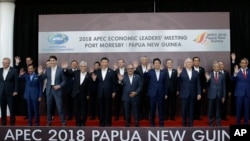Sharp exchanges between US Vice President Mike Pence and Chinese leader Xi Jinping at this year’s Asia Pacific Economic Cooperation (APEC) meetings and the regional body’s failure to issue a joint statement was not just a sign of the deep divide between Washington and Beijing on trade, analysts say.
It was also a reminder of a simmering crisis at the World Trade Organization over reform and the debate about China’s status in the global trade system.
Although Beijing denies that it caused the breakdown at the APEC meetings in Papua New Guinea, directing blame at what it says was the anger Mike Pence brought to the meeting, others argue it was China’s unwillingness to sign the joint statement that caused it to fail.
The reason: wording in the document about unfair trade practices. Phrasing that China felt unnecessarily singled it out.
Clashing Hard Lines
The meeting was a clash of two hard lines, one from the United States and the other from China, said David Kelly, director of research at China Policy, a think tank based in Beijing.
“The way the meeting played out, it does look to a lot of observers that the show as it was run in Port Moresby was not to China’s expectations. China did not expect the kind of opposition that it received,” Kelly said.
APEC accounts for 60 percent of the global economy and at this year’s meeting, members were looking to push for reforms at the WTO, which sets trade rules and decides who gets punished when violations occur.
That didn’t happen, but the issue is likely to continue to fester and be a focus of attention at the upcoming Group of 20 nations meeting in Argentina later this month.
WTO Crisis
In December, the body of judges that makes decisions on disputes between WTO members will no longer have enough panelists to function.
Washington has been blocking the appointment of new judges since August of last year, citing concerns that the appellate body has overstepped its mandate. It also sees the body as falling short when it comes to Chinese rule breaking.
“The WTO is definitely facing a crisis of identity and a simple ability to operate that will grow increasingly severe until the United States, China and other members come to a new consensus about the rules of the game at the WTO,” said Scott Kennedy, deputy director of the Freeman Chair in China Studies at the Center for Strategic & International Studies.
In recent weeks, countries have begun to hammer out proposals for reform at the WTO.
The United States, European Union and Japan have agreed to work together. The three are pushing for stronger enforcement of subsidies to state-backed enterprises, overcapacity and policies that force foreign investors to hand over technology in exchange for market access. All areas where China is seen as a key offender.
China has announced that it too will put forward reforms, it has also warned members that it would not have rules forced upon it as well.
At meetings in Geneva last week, China’s ambassador to the WTO Zhang Xiangchen said Beijing opposes what he called efforts in the name of reform to “put China in a tailor-made straitjacket of trade rules to constrain China’s development.”
Developing nation?
But one area that is a point of growing contention is the second largest economy’s special status as a developing economy, which among other things allows countries to make fewer commitments, delay implementation of new rules and employ higher tariffs.
That status is something many of China’s trading partners see as no longer fitting reality, Kennedy said.
“Looming behind the disagreement in APEC is a broader conversation about China’s role in the global economy about how influential it is, about whether it needs to be treated as a developing country and continue to receive certain types of benefits,” he said.
In the case of China, however, there is no one size fits all definition for the world’s second-largest economy. China’s coastal cities have amazing infrastructure, the country has hundreds of billionaires and yet at the same time there are parts of the country where there are significant poverty, health care, and other issues developing countries face, Kennedy notes.
“The reality is that China cannot be described by one word, the question is which part of China is most relevant regarding its engagement with the global economy, and I think that what western countries and China’s neighbors are arguing is that it is the advanced part of China,” he said.
For its part, however, China has made it clear that it will not accept change to its position as a developing nation.
In his speech at APEC, President Xi Jinping mentioned the rights and needs of developing countries repeatedly, adding that the principle of “special and differential” treatment for developing nations should not be challenged.
“Otherwise the very foundation of the multilateral trading system will be shaken,” Xi said.




